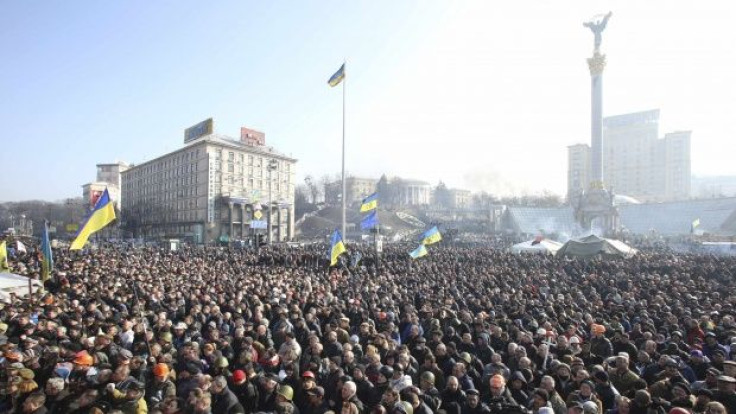U.S. Remains Prepared To Place Sanctions Following Ukraine Peace Deal

Bipartisan coalitions in both the U.S. Senate and the House of Representatives remain prepared to place sanctions against Ukraine should the agreement reached on Friday after peace talks fail.
A peace deal brokered by the European Union brought an end (for now) to several days of fighting between protesters and the forces of President Viktor Yanukovych. The fighting left 77 people dead, making this Ukraine’s bloodiest period in two decades. During the talks, Yanukovych agreed to institute a coalition government, hold early elections and introduce constitutional limits to his power.
But the peace deal may not mark the end of conflicts just yet. In the days leading up to the talks, senior U.S. officials began preparing to launch sanctions against the Ukrainian government, and White House spokesman Jay Carney said sanctions aren’t off the table at the moment.
"Now the focus must be on implementing this agreement, which we will be monitoring closely," Carney said in a statement, before adding that "we remain prepared to impose additional sanctions as necessary.”
Sen. John McCain, R-Ariz., has been one of the most powerful voices calling for sanctions against the Ukrainian government. In a joint statement with Sen. Chris Murphy, D-Conn., on Wednesday, McCain condemned the government, declaring that there “must be consequences” for Yanukovych’s use of violence against his own people. The sanctions proposed by McCain and Murphy would target only members of Yanukovych’s administration who are tied to the violence.
The following day, McCain appeared on Phoenix radio station KFYI to say the issue extends far beyond Ukraine itself. According to McCain, Russian President Vladimir Putin has “played” the United States by stopping it from intervening against Yanukovych. For this, McCain called Barack Obama “the most naïve president in history.” McCain also reiterated the necessity of imposing sanctions.
“This thing could easily spiral out of control into a major international crisis. The first thing we need to do is impose sanctions on those people who are in leadership positions,” McCain said.
Similarly, Sen. Marco Rubio, R-Fla., a member of the Senate Foreign Relations Committee, called on the Obama administration to “use every diplomatic means at its disposal” to punish Yanukovych and other officials involved in the violence.
“Twenty-five years after the people in the then-captive nations of Eastern Europe changed world history, we again see Ukrainians taking to the streets to demand nothing more than the right to independently chart the future course of their nation and a better life for themselves and their children,” Rubio said, according to the Washington Times.
“Ukrainians have made clear that they want the opportunity to be governed free of corruption and Russian pressure. I strongly condemn the Yanukovych government resorting to violence rather than dialogue and compromise with the opposition,” he continued.
Congressional leaders across the aisle have also called for sanctions against Ukraine. Rep. Eliot L. Engel, D-N.Y., senior Democrat on the House Foreign Affairs Committee and author of a resolution condemning the violence in Ukraine, similarly called on the United States to impose sanctions.
“I urge the administration to take immediate action and impose targeted sanctions, including visa restrictions and the freezing of all financial assets, against those individuals responsible for authorizing and engaging in violence, in particular against peaceful protesters,” Engel said in a statement released Wednesday.
“The United States must stand up for the democratic and human rights of the citizens of Ukraine, and for their democratic aspirations and right to choose their own future,” Engel continued.
© Copyright IBTimes 2024. All rights reserved.












